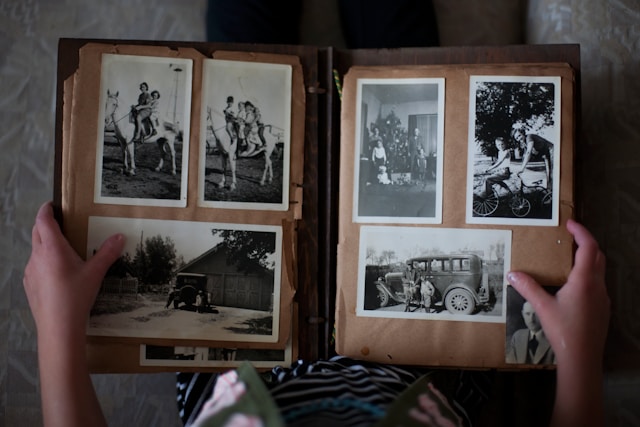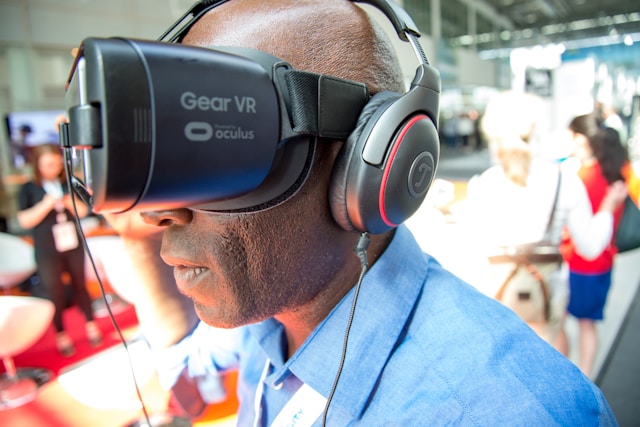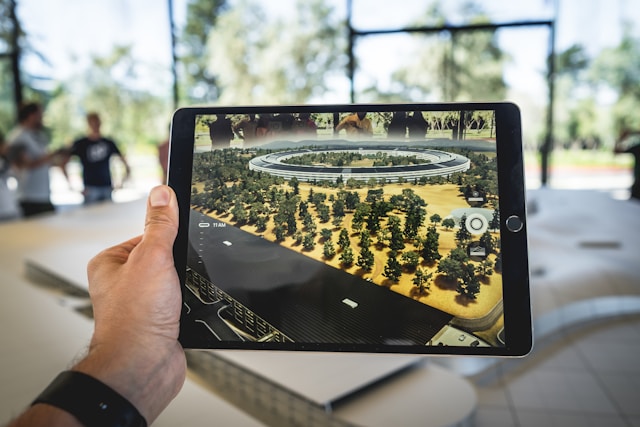Innovative New Technologies in Dementia Care
 Submitted by Mary Anne Roberto
Submitted by Mary Anne Roberto
Always Home Connected
As a dementia care specialist, one of my goals is to create awareness about cognitive changes many older adults face and provide resources to help with the daily challenges caregivers face.
As a caregiver, you may find yourself facing a myriad of emotions, from confusion to guilt, as you witness your parent’s decline. However, armed with knowledge and empathy, you can transform these challenges into opportunities for growth and connection.
Using complementary approaches enhances the effectiveness of validation therapy by providing additional opportunities for connection and emotional validation. I recommend incorporating reminiscence activities, purposefully designed toys, and virtual reality apps, to create enriching experiences for your loved one. Together, these techniques can provide cognitive stimulation, emotional well-being, and a sense of connection for your loved ones living with dementia.
What is Validation Therapy?
Validation therapy is a technique I have found to be profoundly impactful in dementia caregiving. It involves validating the emotions and experiences of individuals with dementia instead of correcting them. For example, if your loved ones insist on going to work despite being retired, you might empathize with their feelings of responsibility and engage them in a meaningful activity at home.
What Are Integration Reminiscence Activities?
Reminiscence therapy and the use of dementia-specific toys can complement validation therapy by providing additional connection, and emotional validation. Engaging your parent in activities that evoke positive memories and spark recognition can foster moments of joy and connection amidst the challenges of dementia caregiving.
Reminiscence therapy involves encouraging individuals with dementia to recall and share memories from their past. I firmly believe that reminiscence therapy and the use of dementia-specific toys can greatly enhance the effectiveness of validation therapy. These complementary approaches offer invaluable opportunities for connection and emotional validation, which are essential aspects of providing compassionate care for individuals with dementia.
Reminiscence therapy holds a special place in my heart, as it allows individuals to reconnect with cherished memories from their past. I’ve witnessed firsthand the profound impact reminiscing about meaningful experiences can have on parents with dementia. It not only validates their life journey but also reaffirms their sense of identity and self-worth. By engaging in reminiscence activities, you can create moments of joy and connection amidst the challenges of dementia caregiving.

How To Use Dementia Toys in Dementia Care
Similarly, the use of dementia-specific toys adds another dimension to validation therapy by providing tangible tools for engagement and stimulation. These purposefully designed toys stimulate cognitive function and evoke positive memories, offering your loved ones a sense of comfort and familiarity. I’ve seen how something as simple as a personalized puzzle or sensory stimulation kit can brighten someone’s day and ease their anxiety.
Dementia-specific toys play a transformative role in enhancing the quality of life for individuals with dementia. From textured objects to familiar scents, these purposefully designed toys stimulate cognitive function and evoke positive memories. For instance, I often recommend sensory stimulation kits filled with various textured objects and familiar scents to calm restless minds and alleviate anxiety associated with dementia.
Moreover, the benefits of dementia-specific toys extend beyond mere sensory stimulation. Engaging with these toys encourages active participation and promotes a sense of accomplishment in your loved one with dementia. Whether it’s completing a personalized puzzle or exploring a memory book filled with familiar faces and places, these activities provide meaningful opportunities for cognitive engagement and emotional connection.
Harnessing the Transformative Power of Dementia Toys to Enhance Quality of Life
I’ve witnessed the profound impact that these toys can have on the well-being of people living with dementia. By incorporating dementia-specific toys into daily routines, you can create enriching experiences for your parent that foster cognitive stimulation, emotional comfort, and moments of joy. It’s about recognizing the therapeutic potential of play and harnessing it to enhance the lives of those affected by dementia, one toy recommendation at a time.
David, a retired teacher living with dementia, often struggled with restlessness and agitation. However, with the introduction of a sensory stimulation kit filled with textured objects and familiar scents, David found solace and comfort. The tactile experiences provided by the toys helped to calm his mind and ease his anxiety, allowing him to rediscover a sense of peace and contentment.
Not only did these toys help David feel more relaxed, but they also gave his mind a workout. Figuring out how each toy worked and what it felt like kept his brain active. Over time, he noticed that he could think more clearly and remember things better. It was like his mind was waking up from a long sleep.
How to Combine Reminiscence Activities and Dementia Toys into Validation Therapy
I recommend integrating reminiscence therapy and the use of dementia-specific toys with validation therapy. These complementary approaches can enhance the effectiveness of validation therapy by providing additional opportunities for emotional validation. By incorporating reminiscence activities and engaging with purposefully designed toys, you can create enriching experiences for your parent. This will promote cognitive stimulation, emotional well-being, and a sense of connection.
The Smith family’s experience serves as a compelling example of applying validation therapy and reminiscence techniques in dementia caregiving. The Smith family’s journey with dementia began when they noticed subtle changes in their mother’s behavior. Mrs. Smith, a once vibrant and independent woman, was now struggling with memory loss and confusion. Concerned for her well-being, her adult children, Emily and Michael, sought guidance on how best to support her.
During our consultations, we explored the concept of validation therapy—a technique that acknowledges and validates the emotions and experiences of individuals with dementia. Armed with this knowledge, Emily and Michael embraced their mother’s reality, meeting her where she was rather than trying to correct her.
Through the use of reminiscence therapy, facilitated by dementia-specific toys such as memory books and personalized puzzles, the Smith family discovered new avenues for connection and joy. They delighted in sharing stories from their mother’s past, sparking moments of recognition and laughter amidst the challenges of dementia.
The Use of Virtual Reality and Smart Phone Apps in Dementia Care
Advancements in technology offer promising avenues for enhancing the well-being of individuals with dementia. Virtual reality (VR) experiences can transport individuals to familiar places, evoking feelings of nostalgia and comfort. Smartphone apps tailored for dementia can support memory recall and cognitive function, offering personalized support tailored to individual needs.

Virtual Reality: Transporting Minds to Familiar Places
Virtual reality (VR) technology and smartphone apps tailored for dementia care can significantly enhance the well-being of individuals living with dementia. As a caregiver deeply invested in providing holistic care, I’ve seen firsthand the positive impact these innovative technologies can have on the lives of those affected by dementia. Here are some details about each, along with suggestions for specific ones.
Virtual reality experiences immerse individuals in simulated environments, often reminiscent of familiar places or experiences from their past. VR has been shown to reduce agitation, improve mood, and evoke feelings of nostalgia and comfort in individuals with dementia. Here are some specific VR programs tailored for dementia care:
Rendever
Rendever offers VR experiences designed specifically for seniors, including those living with dementia. Their platform allows users to explore virtual environments, visit iconic landmarks, and reminisce about past experiences.
VRHealth
VRHealth provides virtual reality solutions for healthcare, including programs tailored for dementia care. Their VR experiences focus on relaxation, cognitive stimulation, and reminiscence therapy.
Alcove VR
Alcove VR offers a range of immersive experiences designed to engage and entertain individuals with dementia. From virtual travel to interactive games, Alcove VR provides a variety of stimulating activities.

Smartphone Apps
Smartphone apps tailored for dementia care can support memory recall, cognitive function, and overall well-being, providing invaluable assistance to you while caring for your parent. As a caregiver specializing in dementia care, I’ve found these apps to be essential tools for enhancing communication, promoting engagement, and streamlining daily caregiving tasks.
MindMate
MindMate is a comprehensive app designed to support brain health and cognitive function. It includes features such as brain games, personalized daily exercises, and reminders for medication and appointments.
MemorySparx
MemorySparx offers a range of tools and activities to support individuals living with dementia and their caregivers. The app includes features such as memory aids, personalized photo albums, and mood tracking.
ElderGuide
ElderGuide provides practical tools and resources for caregivers, including medication reminders, care coordination tools, and access to support networks. The app aims to streamline caregiving tasks and improve communication between caregivers and healthcare providers.
By incorporating virtual reality experiences and smartphone apps into dementia care plans, caregivers can provide personalized support tailored to the individual’s needs and preferences. These innovative technologies offer promising avenues for enhancing the well-being and quality of life of individuals living with dementia.
The Role of Artificial Intelligence in Personalized Care
The integration of artificial intelligence (AI) into dementia care represents a groundbreaking frontier, poised to revolutionize personalized support. Leveraging AI’s capacity to process extensive data sets, sophisticated algorithms can discern subtle patterns in behavior. It can also predict shifts in cognitive function with remarkable accuracy. This predictive capability empowers you with invaluable foresight, enabling you to proactively tailor interventions and support strategies to meet the evolving needs of your parent.
As a caregiver deeply committed to providing the best possible care for individuals with dementia, I highly recommend exploring the potential of AI in dementia care. For example, you can utilize AI-driven monitoring systems that analyze daily activities and behaviors to detect subtle changes indicative of cognitive decline or health issues. By embracing AI-driven solutions, you can also gain valuable insights into the unique needs and behaviors of your loved ones. This innovative approach has the potential to revolutionize the way we support individuals with dementia, ultimately improving their quality of life and well-being.
The Importance of a Support System
As we delve into the innovative world of AI-driven personalized care, it’s essential not to overlook the crucial role of support systems in dementia caregiving. Throughout my years of practice, I have seen the invaluable role that support networks play in the lives of caregivers. Connecting with others who understand the journey can provide solace and strength. I recommend joining local dementia caregiver support groups, where you can share insights, exchange coping mechanisms, and get emotional support. This sense of interconnectedness fosters resilience, empowering caregivers to face each day with renewed determination and hope.
Sarah’s journey as a dementia caregiver was marked by moments of uncertainty and exhaustion. As her father’s dementia progressed, she struggled to balance his care with her own needs and responsibilities. However, with the help of a local dementia caregiver support group, Sarah found renewed strength and resilience.
In the supportive environment of the group, Sarah discovered that she was not alone in her struggles. She gained valuable insights from fellow caregivers, learning practical strategies for managing challenging behaviors and prioritizing self-care. Together, they celebrated victories, no matter how small, and offered each other unwavering support and understanding.
Conclusion
Innovative approaches, such as reminiscence therapy, dementia-specific toys, virtual reality experiences, smartphone apps, and artificial intelligence, offer promising avenues for enhancing the quality of life for seniors with dementia. By integrating these approaches into dementia care plans, you can provide personalized support to your parent with dementia.
Moreover, the crucial role of support systems cannot be overstated, as connecting with others who understand the journey can provide invaluable insights. As we navigate the complexities of dementia caregiving, let us embrace these advancements and support networks to foster resilience, and improve the well-being and quality of life of those affected by dementia.
Mary Anne Roberto
Always Home Connected
Always Home Connected offers curated activities, selected in consultation with professionals, aging services providers, family, and friends. Our goal is to provide families and caregivers with activities that can create meaningful engagement for individuals with cognitive decline.

